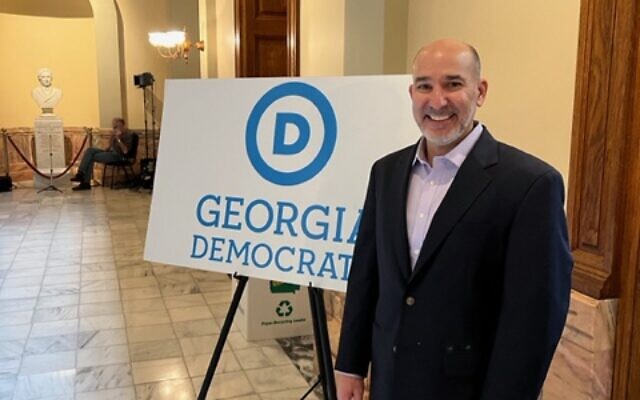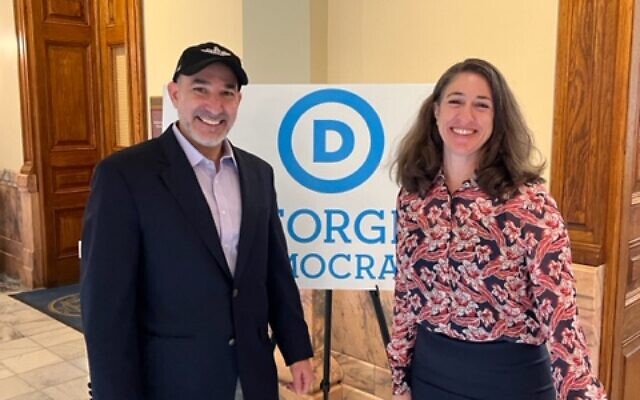Rose Lubin’s Father Seeks Georgia Senate Seat
The self-described "pragmatic Democrat" sees his candidacy as honoring his daughter, who was slain while serving in the Israel Defense Forces.
Dave Schechter is a veteran journalist whose career includes writing and producing reports from Israel and elsewhere in the Middle East.

David Lubin’s earliest lessons in politics came from his maternal grandfather, Melvin Lapides, who ran Little Lap’s, a dry good store in Osceola, Ark., and was active in Democratic party politics.
Lapides once bought an old milk truck, slapped campaign posters on the side, and mounted speakers on its roof. He would take his grandchildren on board and drive around town, the children yelling out campaign slogans.
Lubin grew up in West Memphis, Ark., and across the Mississippi River in Memphis, Tenn. His father, Nathan Lubin, also was active in politics. In those years, a young politician named Bill Clinton was elected as Arkansas’ attorney general and governor, and then President of the United States. “As a kid I went on this path of watching a politician going from the very beginning up to the presidency. Our family kind of rode that ride with him,” Lubin said.
Though he did not foresee himself entering politics, “There’s always been this drive in me to be active, to be involved,” he said.

Two events, one personal and the other political, changed Lubin’s mind on seeking public office and now the 47-year-old general contractor is challenging incumbent state Sen. Sally Harrell for the Democratic nomination in Georgia’s 40th Senate district.
On Nov. 6, 2023, the eldest of his five children, 20-year-old Rose Ida Lubin, a 2021 graduate of Dunwoody High School, was stabbed to death in the Old City of Jerusalem, where she was serving in the Israel Defense Forces border police.
The tragedy reverberated from the Jewish community in Atlanta to Mount Herzl in Jerusalem, where she was laid to rest. Clinton was among those who called to express condolences.
Then came the Jan. 25 votes in the Georgia House and Senate on House Bill 30, legislation that would add to the state code a reference to the definition of antisemitism adopted by the International Holocaust Remembrance Alliance.
Lubin had contacted Democratic Rep. Esther Panitch, the lone Jewish voice in the General Assembly, offering his help in the effort to pass the bill, which had fallen short of approval the previous two years.
This time HB 30 cleared the House and moved to the Senate.
In a Senate floor speech — “off the cuff” and admittedly “not one of my best,” she later acknowledged — Harrell expressed reservations about the legislation and alluded to Rose Lubin’s death.
To the surprise of Jewish Atlantans watching from the Senate gallery — Lubin among them — and the disappointment of many in the community, Harrell abstained, technically being listed as excused from the vote.
Lubin met with Harrell in the days following the vote. “I wasn’t angry initially. I’m still not angry at her, but it made me pause for a moment and understand the significance of what had happened,” he said.

Lubin had four children, including Rose, from a previous marriage when he and Stephanie Keating married in 2017 and the couple later added a fifth to their family. They live in Dunwoody and are members of Congregation Ariel.
David and Stephanie understood that through the tragedy of Rose’s death they had a voice that could be exercised publicly. The controversy over House Bill 30 “sparked a fire in me,” he said, deciding “that I can do better, that in the Senate our district needs something better.”
So, at the state capitol on March 6, he filed the papers necessary to be a candidate. The Democratic primary is May 21.
The University of Georgia graduate calls himself a “pragmatic Democrat,” seeking to represent what he calls a “blue-purple” district. Lubin knows that he will have to reach voters beyond the Jewish community. “What people want is someone representing them who understands some of the key parts of their life,” he said.
Which explains his top issue priority — transportation. “It impacts my district probably more than anywhere in the state,” Lubin said, citing the effect that backups on Interstate 285 have on Dunwoody, Chamblee, Doraville, Tucker, and other parts of District 40. Economic productivity is lost and the health (physical and mental) of motorists is imperiled.
Lubin said that congestion forces him to leave his office in Tucker — where he is president of Diversified Construction of Georgia, a business he founded in 2001 — an hour and a half early to pick up one of his children from the Marcus Jewish Community Center in Dunwoody.
A major reason for the problems on I-285, he said, are the 18-wheel, tractor-trailer trucks for whom the interstate highways are major arteries.
One solution, Lubin said, would be investment in the construction of additional intermodal freight transport sites, particularly utilizing rail, to bypass I-285, which also would benefit truckers who lose precious time navigating the clogged highway. At present, there are two dozen intermodal locations in Georgia, with about a half dozen in Atlanta.
Of the roughly 193,000 residents of District 40, in the range of 7 to 10 percent are thought to be Jewish.
The community is “struggling,” he said, with incidents of antisemitism that began well before the Oct. 7 Hamas-led terror attacks in Israel but have spiked in recent months. “As American Jews, that is the biggest challenge that we face and when we have leaders that can’t get on our side, we’ve got to do something about this.”
Lubin wants the Jewish community to have more than one voice among the 180 members of the House and 56 of the Senate. “I think it’s necessary. We’re a critical part of the state and we need to be represented. We need our voice to be heard,” he said.
In stepping forward to serve his community, Lubin sees himself as honoring the memory of his daughter. “That is what I taught Rose and what she taught me,” he said.
- News
- Local
- Dave Schechter
- David Lubin
- Melvin Lapides
- Nathan Lubin
- Bill Clinton
- Sen. Sally Harrell
- Rose Ida Lubin
- Dunwoody High School
- Israel Defense Forces
- House Bill 30
- International Holocaust Remembrance Alliance
- Rep. Esther Panitch
- Stephanie Keating
- Congregation Ariel
- University of Georgia
- Diversified Construction of Georgia



comments